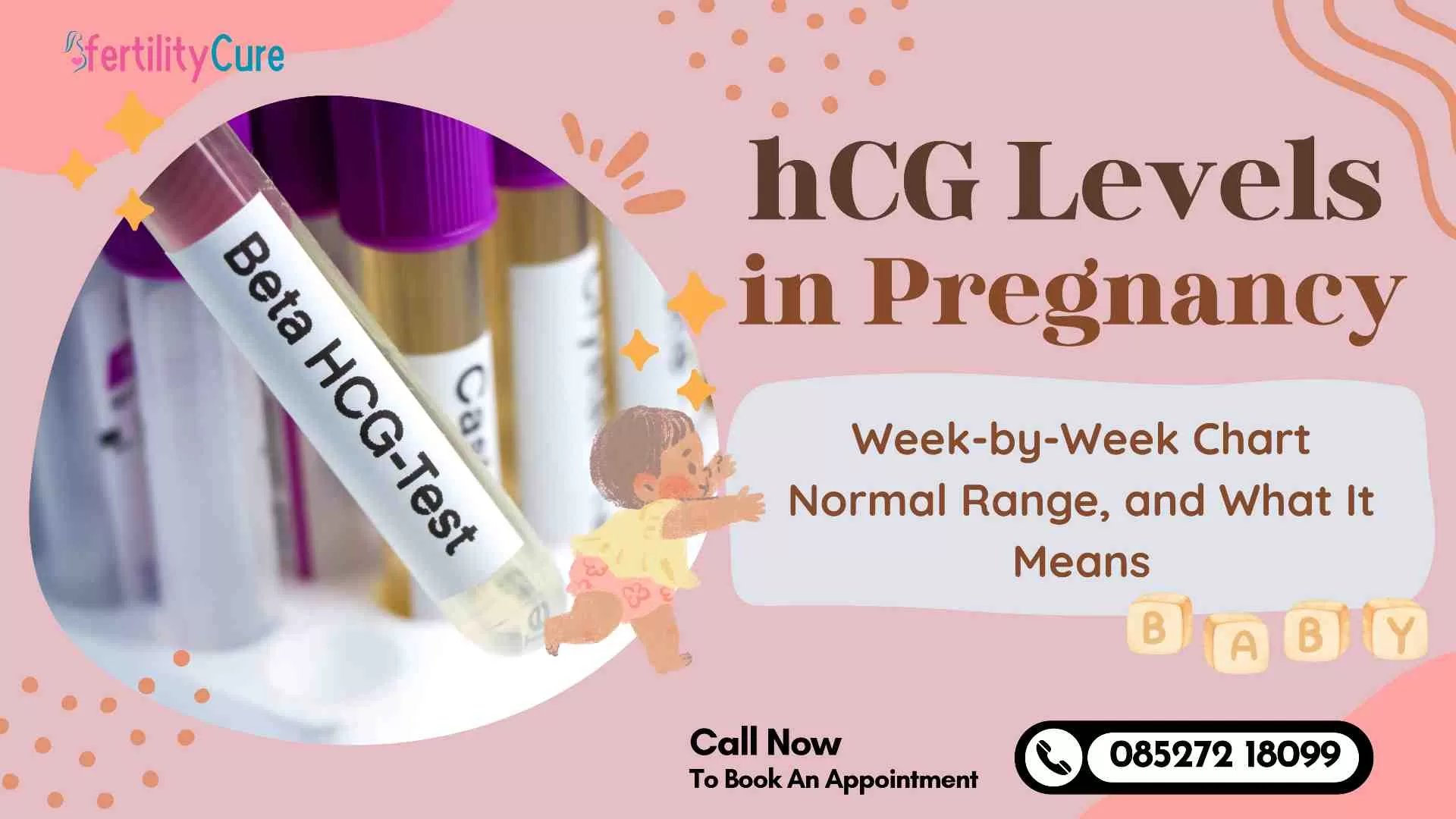hCG Levels in Pregnancy: Week-by-Week Chart, Normal Range, and What It Means
by:Fertility Cure Centre
|
onMay 19, 2025
In:World
|
TypeHealth and Wellness Tips

Introduction
When you're trying to confirm a pregnancy or track how it's progressing, one term keeps coming up again and again—hCG level in pregnancy. You see it on your blood test reports, hear it from your doctor, and maybe even Google it late at night when you feel unsure. But what does it mean? Furthermore, how do you know if your hCG number is correct?
Many women are excited, worried, and have questions in the first few weeks of their pregnancy. You want to believe everything is okay, but numbers on a lab report can feel confusing and, sometimes, scary. That's why understanding your hCG level in pregnancy—what it does, how it rises, and when it should be checked—can give you the peace of mind you need.
In this guide, we'll break it all down clearly—week-by-week hCG charts, normal and abnormal ranges, what rising or falling numbers might mean, and when to speak to your doctor. Whether you're going through IVF, monitoring a high-risk pregnancy, or want clarity in those early weeks, this is for you.
What is hCG, and Why Is It Important in Pregnancy?
The word "hCG" may seem like another hard-to-understand medical term. But this small hormone is crucial in the early stages of pregnancy. hCG stands for human chorionic gonadotropin. It's one of the first signs that your body is getting ready for something truly amazing: a baby.
Once a fertilized egg implants in the uterus, your body starts making hCG. The placenta makes it as it grows and tells your body to support the baby. HCG is found in most pregnancy tests, whether in blood or urine.
Why is it so important? Because hCG helps the body make progesterone, which helps keep the uterus lining healthy and the pregnancy going strong in the first few weeks. It's possible that your body won't know to guard and feed the growing embryo if it doesn't have enough hCG.
hCG Levels Week by Week: What’s Normal?
One of the most common questions women ask in early pregnancy is, “Are my hCG levels normal?” It’s easy to get caught up in the numbers, especially if you’re going through IVF or have had a difficult journey. But the truth is, hCG levels can vary widely from one woman to another and even from one pregnancy to the next.
What doctors look for is not simply the quantity, but also how your hCG level changes over time. A healthy pregnancy normally results in a steady increase in hCG, particularly in the first several weeks.
hCG Levels Week-by-Week Chart (Based on LMP – Last Menstrual Period)
| Pregnancy Week | Expected hCG Level (mIU/mL) |
|---|---|
| 3 weeks | 5 – 50 |
| 4 weeks | 5 – 426 |
| 5 weeks | 18 – 7,340 |
| 6 weeks | 1,080 – 56,500 |
| 7 to 8 weeks | 7,650 – 229,000 |
| 9 to 12 weeks | 25,700 – 288,000 |
| 13 to 16 weeks | 13,300 – 254,000 |
| 17 to 24 weeks | 4,060 – 165,400 |
| 25 to 40 weeks | 3,640 – 117,000 |
Note: These ranges are averages. What matters most is whether your levels rise consistently in the early weeks.
When do hCG levels peak?
Typically, hCG levels peak around week 9 or 10, then slowly begin to decline and level off for the rest of the pregnancy. This is why some women notice their nausea or other symptoms improving around the end of the first trimester—your hormone levels are starting to stabilise.
How fast should hCG rise?
In early pregnancy, your hCG should roughly double every 48 to 72 hours. A slower rise could mean a possible issue, but not always. Many healthy pregnancies don’t follow the textbook pattern. That’s why your doctor may check your levels multiple times before drawing conclusions.
What Are Normal hCG Levels in Early Pregnancy?
When you get a blood test report, you probably look at the number—“What’s my hCG level?” Then comes the worry: Is this number sufficient? Too low? Too high? What does it mean?
The truth is, there’s no single “perfect” hCG number in early pregnancy. Every woman’s body responds differently; even a healthy pregnancy can fall on the lower or higher end of the chart. Still, general ranges help doctors track how things are going.
In the first 4 to 6 weeks of pregnancy, here’s what is commonly considered “normal”:
| Weeks Since LMP | Normal hCG Range (mIU/mL) |
|---|---|
| 3 – 4 weeks | 5 – 426 |
| 4 – 5 weeks | 19 – 7,340 |
| 5 – 6 weeks | 1,080 – 56,500 |
If your number falls in this range, it's generally a good sign. But even if it doesn't, it doesn't always mean something is wrong. What truly matters is
- How quickly the number is rising (doubling every 2–3 days in early weeks is ideal)
- How your body feels — symptoms, bleeding, or cramping
- What your follow-up tests show over a few days
What if my hCG level is low?
Sometimes, low hCG levels in early pregnancy just mean you're earlier along than you thought. But your doctor may investigate further if the levels stay flat or drop over time. This could point to a miscarriage or ectopic pregnancy—but that's not always the case right away. Many healthy pregnancies have started with low numbers.
When is a low hCG not a concern?
If your hCG is doubling as expected, and you're not experiencing pain or bleeding, your doctor may just keep monitoring you. In some cases, women with PCOS or irregular cycles naturally have different timelines, and that's okay.
Low hCG Levels in Pregnancy: Causes and What to Do
Some people might be upset when they see a low number on their hCG report, especially if they are looking for a clear sign that they are pregnant. Now, try not to freak out and take a big breath. A low amount of hCG doesn't usually mean there is a problem. It can mean that you are earlier than you thought.
Still, it makes sense to wonder: Why is my hCG level low? Here are some reasons that could be true:
Common Causes of Low hCG Levels in Pregnancy
- Very early testing: If you test a few days after implanting, your hCG level may be low because it hasn't had time to rise yet.
- Miscalculated dates: If your ovulation or implantation happened later than usual, your pregnancy may be earlier than you thought—and so is your hCG.
- Slow-rising pregnancy: Sometimes, hCG rises slowly but still leads to a healthy baby. This is why doctors often test again after 48–72 hours.
- Possible miscarriage: When your hCG levels drop instead of rising, it may indicate that the pregnancy has come to an end. The doctor will closely monitor all these events.
- Ectopic pregnancy: If a woman has low levels of the hormone HCG and other symptoms, such as pain or bleeding, it may be an indication that she is experiencing an ectopic pregnancy. This type of pregnancy occurs when the baby is implanted outside of the uterus.
What should you do if your hCG is low?
- Repeat the test. hCG is all about the trend—one number doesn't say much. What matters is whether it rises or falls in 2–3 days.
- Talk to your doctor about all of your symptoms, even if they don't seem serious. There is a possibility that cramping, spotting, or exhaustion could assist conclude the picture.
- Self-diagnosis is not good. The truth is that your experience is one of a kind, despite the fact that it is tempting to Google every figure. Give your doctor the opportunity to assess the data in the context of the situation.
While a low hCG level may seem dire, it often marks the start of a slower yet healthier journey. Allow your body to tell its story at its own pace until it is finished.
High hCG Levels: What Could It Mean?
Occasionally, the opposite happens—you get your blood test back, and the hCG number seems too high. That can feel just as confusing as a low number. You start wondering: Is something wrong? Or could this be a positive sign?
Here's the truth: high hCG levels in pregnancy can mean a few different things, and not all of them are harmful. Some of these situations might be a reason to smile.
When high hCG is completely normal
- You might be carrying twins or multiples. One of the most common reasons for high hCG is a multiple pregnancy. Your body produces more hCG because it's supporting more than one embryo. This is especially common in IVF cycles.
- Your dates might be off. If you ovulated or implanted earlier than you thought, your pregnancy is further along, and your hCG is higher. It's more common than you'd think.
When high hCG levels need closer monitoring
- Molar pregnancy (rare) A molar pregnancy is a rare disease in which tissue grows inside the uterus in a way that isn't normal. It often leads to very high amounts of hCG and strong symptoms like feeling sick or bleeding. You can treat it, but you need to act quickly.
- Gestational trophoblastic disease (GTD) GTD is another rare cause of high hCG. It happens when maternal cells grow in a way that isn't normal. Again, this doesn't happen very often, but your doctor might check for it if your hCG level is extremely high.
What should you do if your hCG is high?
- Don’t assume the worst. High numbers can be exciting, especially if twins are a possibility!
- Let your doctor decide the next steps. They may suggest an early ultrasound to see what’s going on and confirm how far along you really are.
- Stay calm. One high number doesn’t mean something is wrong. It just means your body is doing a lot, and your doctor may want to take a closer look.
If your hCG level in pregnancy is higher than expected, don’t jump to conclusions. It could be something beautiful, like two heartbeats instead of one.
hCG Doubling Time: How Fast Should It Rise?
You've probably heard the phrase "your hCG is doubling"—but what does that mean? And why does everyone keep talking about it in early pregnancy? In the first few weeks after conception, your hCG level in pregnancy doesn't just increase—it's supposed to double every 48 to 72 hours. Doctors can tell how well the pregnancy is going by this steady rise.
What is hCG doubling time?
Doubling time is the amount of time it takes for your hCG level to double. For example, a rise from 100 on Monday to 200 by Wednesday or Thursday is a good sign. This means your body produces hCG at a healthy rate, and the embryo is likely growing well.
What's considered a healthy doubling pattern?
- In most healthy pregnancies, hCG doubles every 2 to 3 days during the first 4–6 weeks.
- After 6–7 weeks, the doubling rate decreases naturally as the pregnancy develops.
- It's okay if the number takes closer to 72 hours to double—slightly slower rises can still be expected.
When should a slow hCG rise be a concern?
Your doctor may want to keep a closer eye on you if your hCG level continues to rise but doesn't double over a few days. A slow rise in hCG could mean:
- A miscarriage in progress
- An ectopic pregnancy
- A pregnancy that implanted late and is still catching up
But again, it depends on your unique situation. Some healthy pregnancies do not adhere to the "perfect" rule and still achieve satisfactory outcomes.
The time it takes for your hCG to double is only one part of the story. Doctors use it to track your pregnancy, but it's not the only way to tell if it's going well. Wait for your body to tell you something, and go easy on your doctor, as they will explain what those numbers mean.
How is hCG measured, and What Tests Are Used?
When you’re early in pregnancy, and your doctor wants to “check your hCG,” it might feel a little technical. But don’t worry—it’s a simple process. There are two main ways to measure your hCG level in pregnancy: both are safe and easy.
Two Common hCG Tests
| Test Type | What It Does | When It's Used |
|---|---|---|
| Urine Test | Tells you if hCG is present (yes/no answer) | Home pregnancy tests, early check |
| Blood Test | Tells you the exact hCG number (in mIU/mL) | Monitored pregnancies, IVF, and early tracking |
Which one do I need?
- Urine tests (like home kits) only say “pregnant” or “not pregnant.” You can perform them as early as 10–14 days after ovulation.
- Blood tests give a much more detailed picture. They show exactly how much hCG is in your system—and whether it’s rising the way it should.
If you are undergoing IVF, have a history of miscarriage, or your doctor wants to monitor early development closely, they will likely use a blood test and repeat it after 2-3 days to track your progress.
What If My hCG Level Doesn’t Match My Pregnancy Symptoms?
It can feel unclear when your body and test results don’t match.
Maybe your hCG levels look perfectly fine on paper, but you don’t feel pregnant—no nausea, soreness, or anything. Or perhaps you feel everything—dizziness, food aversions, exhaustion—but your blood test shows a number that feels too low.
At that moment, it’s easy to panic. But here’s what many women don’t realise: hCG levels and pregnancy symptoms don’t always move in sync.
Your body reacts to pregnancy hormones in its own way. Some women experience intense symptoms with low levels. Others feel almost nothing, even when their hCG is rising fast. That doesn’t mean your pregnancy is in danger—it just means your body responds differently.
Also, symptoms come and go. One day, you may feel a wave of fatigue, and the next day, you feel completely normal. That’s common in early pregnancy, especially in the first few weeks.
Instead of focusing on one test or one day, doctors look at the pattern over time—is your hCG increasing the way it should? Are you feeling okay overall? Are there any signs that something might need attention?
So, if you’re confused by the mismatch between your symptoms and your hCG, you’re not alone. It happens to so many women. You need patience, a little more time, and the support of a doctor who understands your whole story, not just your lab report.
Final Thoughts: Understanding hCG Without the Stress
It's not just about the signs or the numbers on the test; pregnancy is a personal journey that feels different for each woman. When hCG levels are the primary focus in the first few weeks, it's easy to forget that behind every report is a real person watching, hoping, and often worrying.
Yes, hCG can give important clues. It helps doctors understand if your pregnancy is progressing. But it's not the whole story—and it's never the only one that matters.
Do not give up if you believe your amounts are too low, too high, or simply incorrect. What matters most are the changes in these amounts over time, the sensations in your body, and the support you receive throughout the process.
So give yourself room, ask what you need, and keep caring for your body. You deserve honest replies and gentle care, no matter how smooth or rough your journey is.
Don't go through it alone if you don't know what to do next. This is your journey, but you don't have to go alone. We're here to help you understand and walk you through it step by step.
Helpful Resources
- Contact Us: Schedule Your First Free Consultation with Us
- Post: Signs of Successful Embryo Implantation After IVF
- Learn More: What is IVF and How Does It Work?
- Explore: Understanding Week-by-Week Pregnancy After IVF Transfer
- Doctor Profile: Meet Dr. Seema Saxena
- Google Maps: Find Us on Google Maps

